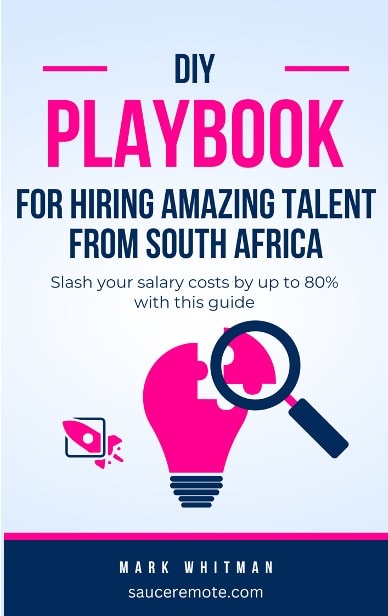Considering bringing UK talent into your team? Excellent decision!
The United Kingdom boasts a strong economy and a highly skilled workforce, making it an ideal location for international business growth.
But how do you navigate the complexities of UK employment laws and cultural nuances?
Enter the Employer of Record (EOR) in the UK.
In this article, we'll explore how partnering with an EOR in the UK can be your strategic advantage for a seamless and compliant expansion.
Let's get started.

Discover how to slash your salary costs by 80%
Get our exact process for hiring amazing overseas talent from South Africa. Includes copy-and-paste templates and a detailed salary guide.
What Is an Employer of Record in the UK?
An Employer of Record in the UK is a third-party service provider that legally employs workers on your behalf and handles all local legal, HR, and payroll responsibilities.
In short? The EOR becomes the official employer, handling compliance and administrative tasks while you manage your team's day-to-day activities.
Quick tip: If you're unfamiliar with this concept, check out my guide on What Does EOR Stand For for more insights.
So, why do companies work with an EOR in the UK instead of directly hiring employees?
Here are the main reasons:
- Efficient Market Entry: Avoid the time-consuming process of establishing a legal entity in the UK.
- Regulatory Compliance: Navigate the UK's complex employment laws with expert assistance.
- Cost Savings: Reduce overhead and administrative burdens associated with setting up a local entity.
In short, EOR services allow you to tap into the skilled UK labour market quickly and compliantly without the usual obstacles.
But what makes the UK's labour market so attractive, and how can an EOR help you succeed?
Let's delve deeper.
Hire remote talent from South Africa & slash salary costs by 80%
Salaries start from £8,000 per year!
Understanding the UK Employment Landscape
When I first considered hiring in the UK, I was impressed by the country's robust employment laws and professional work culture.
While these laws provide strong protections for employees, they can be difficult for foreign businesses to navigate.
Here's what you need to know:
Standard Working Hours and Overtime
In the UK, the standard workweek is 40 hours, typically 8 hours per day from Monday to Friday.
- Maximum Weekly Hours: Employees should not work more than 48 hours per week on average, calculated over a 17-week period.
- Opt-Out: Employees can choose to opt-out of the 48-hour limit by signing an agreement.
A quick note on overtime in the UK:
- There is no statutory requirement for overtime pay unless it brings the employee's average pay below the National Minimum Wage.
- Overtime rates and conditions are typically outlined in the employment contract.
Refer to the UK Government's Working Time Regulations for detailed information.
Now, let’s look at compensation and currency.
Compensation and Currency
The local currency is the British Pound Sterling (GBP).
The UK has a National Minimum Wage and a National Living Wage:
- National Living Wage (for workers aged 23 and over): £11.44 per hour as of 2024.
- National Minimum Wage: Varies by age group and apprenticeship status.
Companies in the UK also often observe some common compensation practices:
- Bonuses: Performance-related bonuses are common but not mandatory.
- Benefits: Private health insurance, pension contributions above the statutory minimum, and other perks are often provided.
Next, let's explore public holidays and annual leave in the UK.
Hire remote talent from South Africa & slash salary costs by 80%
Salaries start from £8,000 per year!
Public Holidays and Annual Leave
The UK observes 8 public holidays (also known as bank holidays) in England and Wales, with slight variations in Scotland and Northern Ireland.
Bank holidays include the following:
- New Year's Day
- Good Friday
- Easter Monday
- Early May Bank Holiday
- Spring Bank Holiday
- Summer Bank Holiday
- Christmas Day
- Boxing Day
Annual Leave Entitlement:
Employees are entitled to 5.6 weeks of paid annual leave per year, which equates to 28 days for a full-time employee working five days a week.
This entitlement can include the 8 public holidays, depending on the employer's policy.
Now, let’s talk about taxes and social contributions.
Tax Obligations and Social Contributions
Understanding the UK's tax system is essential for compliance:
Income Tax and National Insurance
Employers must handle:
- Pay As You Earn (PAYE): Withholding income tax from employees' salaries.
- National Insurance Contributions (NICs): Both employers and employees contribute.
Income Tax Rates:
- Basic Rate: 20% on earnings above the personal allowance (£12,570) up to £50,270.
- Higher Rate: 40% on earnings from £50,271 to £125,140.
- Additional Rate: 45% on earnings above £125,140.
National Insurance Contribution Rates:
- Employer: 13.8% on earnings above the secondary threshold (£175 per week).
- Employee: 12% on earnings between £242 and £967 per week and 2% on earnings above £967 per week.
For detailed information, consult the UK Government's HM Revenue & Customs (HMRC).
So, what are the leave policies and parental benefits in the UK? Let's find out.
Hire remote talent from South Africa & slash salary costs by 80%
Salaries start from £8,000 per year!
Leave Policies and Parental Benefits
Here's what you should know about employee entitlements in the UK:
Sick Leave
Employees are eligible for Statutory Sick Pay (SSP) of £109.40 per week for up to 28 weeks. SSP is paid after the first 4 consecutive days of sickness.
Maternity Leave
Employees are entitled to take up to 52 weeks of maternity leave. This is split into two parts: the first 26 weeks are known as Ordinary Maternity Leave, and the next 26 weeks are called Additional Maternity Leave.
For Statutory Maternity Pay (SMP), during the first 6 weeks, employees will receive 90% of their average weekly earnings.
For the remaining 33 weeks, they will be paid either £172.48 per week or 90% of their average weekly earnings, whichever is lower.
Paternity Leave
Employees are entitled to up to 2 weeks of paternity leave. For Statutory Paternity Pay (SPP), they will receive either £172.48 per week or 90% of their average weekly earnings, whichever is lower.
In addition, parents can share up to 50 weeks of leave and 37 weeks of pay through Shared Parental Leave.
Probation Period and Termination
Here’s what you must know when hiring employees in the UK:
Probation Period
- Commonly ranges from 3 to 6 months.
- During probation, employees have the same statutory rights as other employees.
Notice Period for Termination
The notice period for termination during probation is typically 1 week's notice but can vary based on the employment contract.
This notice period also varies according to the years of service:
- Less than 2 years' service: Minimum of 1 week's notice.
- 2 years or more: 1 week for each year of service, up to a maximum of 12 weeks.
Redundancy Pay
- Employees with 2 years' service or more are entitled to statutory redundancy pay.
Navigating these regulations can be complex.
That's where an Employer of Record in the UK becomes invaluable. They manage compliance and administrative tasks so you can focus on your business.
Hire remote talent from South Africa & slash salary costs by 80%
Salaries start from £8,000 per year!
How to Choose the Best EOR in the UK
Selecting the ideal Employer of Record in the UK is crucial for hiring UK-based employees.
Consider these factors:
1. Expertise in UK Employment Laws
Your EOR should have in-depth knowledge of:
- Employment Contracts: Crafting compliant agreements.
- Regulatory Compliance: Keeping up with changes in legislation.
- Cultural Nuances: Advising on local business etiquette.
2. Comprehensive Service Offering
Look for an EOR that provides:
- Payroll and Tax Administration
- HR Support and Employee Relations
- Legal Compliance Assistance
- Benefits Management
A provider offering end-to-end solutions will streamline your operations.
3. Transparent Pricing Structure
To avoid unexpected expenses:
- Request a detailed breakdown of fees.
- Understand what's included and any additional charges that may apply.
4. Tailored Solutions
Your EOR should offer flexibility to accommodate:
- Industry-Specific Requirements
- Company Size and Growth Plans
- Unique Business Needs
5. Proven Track Record
Evaluate potential EORs by:
- Reviewing client testimonials and case studies.
- Verifying their experience in the UK.
- Checking for any legal or compliance issues in their history.
6. Local Presence with Global Reach
An EOR with a strong local team offers:
- Cultural Insights: Enhancing team integration.
- Prompt Support: Quick resolution of any issues.
But if partnering with an EOR in the UK doesn't align with your strategy, there's another option.
Hire remote talent from South Africa & slash salary costs by 80%
Salaries start from £8,000 per year!
Exploring Alternative Markets
While the UK offers significant opportunities, it's worth considering other markets that might suit your business objectives.
For instance, South Africa provides a native English-speaking workforce with only an hour or two’s time difference.
If you're interested in hiring South African employees, collaborating with an experienced Employer of Record in South Africa is the answer.
Final Thoughts
In summary, hiring employees in the UK doesn't have to be a daunting task.
By partnering with a reputable Employer of Record in the UK, you can confidently navigate the complexities of local employment laws and cultural practices.
Focus on what you do best—growing your business—while your EOR handles the rest.
